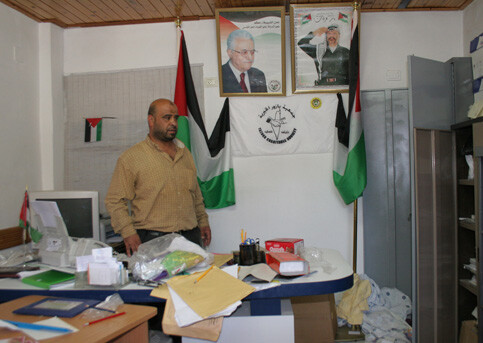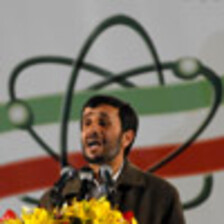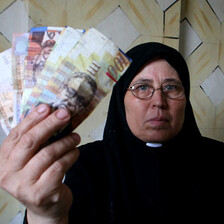The Electronic Intifada 15 July 2008

A Palestinian inspects an office ransacked by the Israeli army in the West Bank city of Nablus, 7 July 2008. (Rami Swidan/MaanImages)
JERUSALEM (IPS) - Shopping malls. Schools. Medical centers. Charities, orphanages. Soup kitchens. These are the latest targets in the campaign the Israeli military is waging against Hamas in the West Bank.
Israeli military officials have identified Hamas’s civilian infrastructure in the West Bank as a major source of the Islamic group’s popularity, and have begun raiding and shutting down these institutions in cities like Hebron, Nablus and Qalqiliya.
Last week, troops focused their efforts in Nablus, raiding the city hall and confiscating computers. They also stormed into a shopping mall and posted closure notices on the shop windows. A girls’ school and a medical center were shut down in the city, and a charitable association had its computers impounded and documents seized.
This policy, officials say, is meant to deny the group the ability to use these institutions as a pipeline by which money is channeled to finance attacks on the Jewish state. But the main goal of this campaign is to stem Hamas’s growing popularity in the West Bank, and ensure it does not seize control of the area as it did in Gaza a year ago, when its forces vanquished the more moderate Fatah movement headed by Palestinian Authority President Mahmoud Abbas.
In Gaza, Hamas was able to capture the hearts and minds of the residents not just because it offered an alternative to the corruption-tainted Fatah leadership, but also because its network of schools, clinics, summer camps, after-school activities and charitable associations provided impoverished Gazans with the type of institutions and welfare alternatives that the Palestinian Authority failed to.
As part of the campaign, Israeli Defense Minister Ehud Barak recently issued orders outlawing 36 non-governmental organizations that function abroad because he said they were raising money for Hamas. According to estimates by defense officials, anywhere between 120 to 200 million dollars has been funneled to institutions associated with Hamas in Gaza and the West Bank over the last year. The money has come from institutions in Saudi Arabia, Jordan, the Gulf States, Europe, South America and the US.
In recent months, the army has also closed down an orphanage, a bakery and other institutions in Hebron, which Israel believes are associated with Hamas. In Gaza, meanwhile, Israel and the Islamic group are observing a truce, but this does not pertain to the West Bank where the Israeli military operates freely.
Writing in the Israeli daily Haaretz newspaper this week, columnist Gideon Levy calls the move against Hamas-related institutions “ludicrous.” Residents of the West Bank, he concludes, “cannot be simultaneously imprisoned, prohibited from earning a living and offered no social welfare assistance while we strike at those who are trying to do so, whatever their motives. If Israel wants to fight the charitable associations, it must at least offer alternative services. On whose back are we fighting terror? Widows? Orphans? It’s shameful.”
By moving against Hamas institutions, Israel runs the risk of increasing the popularity of the Islamic movement and, at the same time, undermining that of Abbas and his Fatah party, who are perceived, correctly or not, as the intended beneficiaries — even if unwitting and unwilling ones — of this policy.
What’s more, Hamas’s popularity does not derive only from its network of schools and charities, but is also very much a direct function of the deep disillusionment among the Palestinian people with the Fatah-led Palestinian Authority and its inability to deliver on its key promises, the central one being an independent state in the West Bank and Gaza. Some in Israel argue that the best way for Israel to block Hamas and bolster Abbas would be to halt construction in Jewish settlements in the West Bank, ease travel restrictions there and, most importantly, ensure there is progress in negotiations with the Palestinian leader.
Many Israeli ministers are highly skeptical about Abbas’s ability to deliver on any peace deal, and so put little store in the negotiations that were renewed last December. Some ministers have even called for the release of Fatah leader Marwan Barghouti, who is serving several life terms in an Israeli jail after being convicted for involvement in attacks in which Israelis were killed during the second Palestinian intifada.
Barghouti, they say, has the political standing among Palestinians that will be required to pull off a deal with Israel, and could draw enough support to wrest back the agenda from Hamas. For now, though, Barghouti remains in jail, talks between a weak Abbas and an embattled Ehud Olmert are limping along, money continues to flow to Hamas, and its popularity remains intact.
All rights reserved, IPS - Inter Press Service (2008). Total or partial publication, retransmission or sale forbidden.





